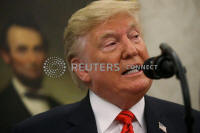Trump to unveil order aiming to boost Medicare health program, woo
seniors
 Send a link to a friend
Send a link to a friend
 [October 03, 2019]
By Jeff Mason [October 03, 2019]
By Jeff Mason
WASHINGTON (Reuters) - President Donald
Trump will unveil an executive order on Thursday aimed at strengthening
the Medicare health program for seniors by seeking to improve its fiscal
position and offer more affordable plan options, administration
officials told Reuters.
The order, which Trump will discuss during a visit to a retirement
community in Florida known as the Villages, is the Republican
president's answer to some Democrats who are arguing for a broad and
expensive expansion of Medicare to cover all Americans, plans that
Republicans reject.
It follows measures rolled out in recent months by the administration
designed to curtail drug prices and correct other perceived problems
with the U.S. healthcare system, though policy experts say those efforts
are unlikely to slow the tide of rising drug prices in a meaningful way.

The Medicare program covers Americans who are 65 and older and includes
traditional fee-for-service coverage in which the government pays
healthcare providers directly and Medicare Advantage plans, in which
private insurers manage patient benefits on its behalf.
Seniors are a key constituency for Republicans and Democrats, and
Florida is a political swing state that both parties woo in presidential
elections.
The order is designed to show Trump's commitment to keeping Medicare
focused on seniors, said one administration official who described its
contents ahead of the announcement.
The order pushes for Medicare to use more medical telehealth services,
which is care delivered by phone or digital means.
The official said that would reduce costs by cutting down on the number
of expensive emergency room visits by patients; lower costs would help
strengthen the program's finances.
The order directs the government to work to allow private insurers who
operate Medicare Advantage plans to use new plan pricing methods, such
as allowing beneficiaries to share in the savings when they choose
lower-cost health services.
It also aims to bring payments for the traditional Medicare
fee-for-service program in line with payments for Medicare Advantage.
Trump's plans contrast with the Medicare for All program promoted by
Bernie Sanders, a Democratic socialist who is running to become the
Democratic Party's nominee against Trump in the 2020 presidential
election.
[to top of second column]
|

President Donald Trump speaks during a ceremonial swearing-in for
Labor Secretary Eugene Scalia at the White House in Washington,
U.S., September 30, 2019. REUTERS/Leah Millis

Sanders' proposal, backed by left-leaning Democrats but opposed by
moderates such as former Vice President Joe Biden, would create a
single-payer system, effectively eliminating private insurance by
providing government coverage to everyone, using the Medicare model.
The senior Trump administration official said Democrats advancing
such ideas were "trying to steal the brand of Medicare and the good
reputation it has in order to mask what would be a disastrous
healthcare plan."
He said Trump's plan sought to modernize the program and preserve it
for senior citizens going forward.
The White House is eager to show Trump making progress on
healthcare, an issue Democrats successfully used to garner support
and take control of the House of Representatives in the 2018 midterm
elections.
In July, the U.S. Department of Health and Human Services (HHS) said
it would propose a rule for imports of cheaper drugs from Canada
into the United States. A formal rule has not yet been unveiled.
The administration also issued an executive order in June demanding
that hospitals and insurers make the prices they charge patients
more transparent, as well as another in July encouraging novel
treatments for kidney disease.
Trump considered other proposals that did not reach fruition.
A federal judge in July shot down an executive order that would have
forced drugmakers to display their list prices in advertisements,
and Trump scrapped another planned order that would have banned some
of the rebate payments drugmakers make to payers.

The administration is also mulling a plan to tie some Medicare
reimbursement rates for drugs to the price paid for those drugs by
foreign governments, Reuters reported.
(Reporting by Jeff Mason; Additional reporting by Caroline Humer and
Carl O'Donnell; Editing by Clarence Fernandez)
[© 2019 Thomson Reuters. All rights
reserved.]
Copyright 2019 Reuters. All rights reserved. This material may not be published,
broadcast, rewritten or redistributed.
Thompson Reuters is solely responsible for this content. |